牛津译林版英语七年级上册单元知识点归纳1-4单元
- 格式:doc
- 大小:59.50 KB
- 文档页数:8
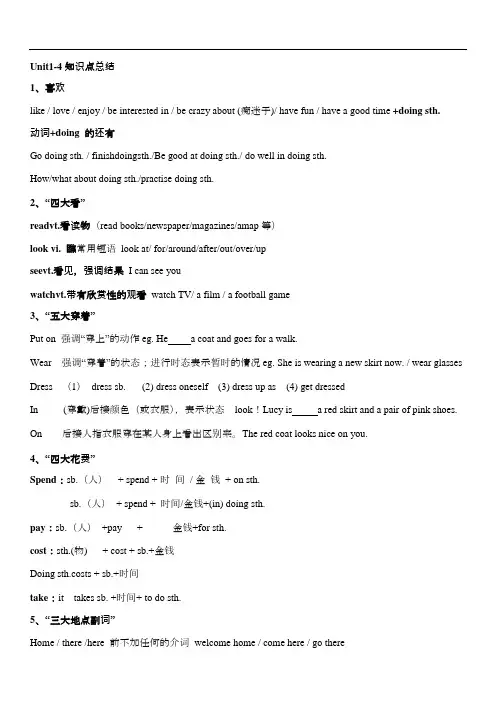
Unit1-4 知识点总结1、喜欢like / love / enjoy / be interested in / be crazy about (痴迷于)/ have fun / have a good time +doing sth.动词+doing 的还有Go doing sth. / finishdoingsth./Be good at doing sth./ do well in doing sth.How/what about doing sth./practise doing sth.2、“四大看”readvt.看读物(read books/newspaper/magazines/amap 等)look vi. 瞧常用短语look at/ for/around/after/out/over/upseevt.看见,强调结果I can see youwatchvt.带有欣赏性的观看watch TV/ a film / a football game3、“五大穿着”Put on 强调“穿上”的动作eg. He a coat and goes for a walk.Wear 强调“穿着”的状态;进行时态表示暂时的情况eg. She is wearing a new skirt now. / wear glasses Dress (1)dress sb. (2) dress oneself (3) dress up as (4) get dressedIn (穿戴)后接颜色(或衣服),表示状态look!Lucy is a red skirt and a pair of pink shoes. On 后接人指衣服穿在某人身上看出区别来。
The red coat looks nice on you.4、“四大花费”Spend:sb.(人)+ spend + 时间/ 金钱+ on sth.sb.(人)+ spend + 时间/金钱+(in) doing sth.pay:sb.(人)+pay + 金钱+for sth.cost:sth.(物) + cost + sb.+金钱Doing sth.costs + sb.+时间take:it takes sb. +时间+ to do sth.5、“三大地点副词”Home / there /here 前不加任何的介词welcome home / come here / go there6、“三大使役动词”Make sb. do sth./ have sb. do sth. / let sb.do sth.7、见面打招呼用语(1)Nice to meet you . (2) Glade to meet you . (3) How are you ? (4) How are you doing ?(5)How is it going ? (6)How is everything going? (7) What’s up?8、基数词+year(s)+old 表示“…岁”提问用“how old”名词性短语数词-year-old 也表示年龄,但其为形容词性短语“前有冠词后有名(词)”Eg. Helen is 11 years old = Helen is an 11-year-old girl.9、Let’s与let us 的区别Let’s do sth. 指包括说话人在内,表示建议Let us do sth.指“让(允许)我们做某事”而对方不做,只有“我们”做10、play+the+乐器类名词eg. Play the pianoPlay + 球类运动play+ football / play cards / play chess11、She comes from Shanghai= She is from Shanghai . 注:如何提问Shanghai 及如何改一般疑问句12 、be good a t =do well in = be clever at = study sth. wellBe good at (反) be bad at do well in (反) be poor in13、介词over 的用法(1)”在…正上方” There is a bridge over the river.(2)”越过” A plane flies over the house(3)”超过” There are over 20 boys in this class.(4)”结束” Class is over! / Game is over.14、every one 与everyone 辨析区别(1)Every one 可以与of 连用,而everyone 却不能与of 连用Eg.every one of the children likes playing the computer games.(2) everyone 只指人=everybody 而every one 既指人又可指物共同点:谓语动词都要用“三单”15、family 的用法:“家庭”作为整体谓语动词用“单数”He has a big family.“家人”强调成员,是复数含义,谓语动词用“原形” My family are at home.拓展:集体名词有people、class、police、sheep、deer、furniture 等16、all/ both/ each/every/neither/ either 的用法all (1)三者或三者以上“全部、都”(2)all + the + 名词(all the afternoon = the whole afternoon)(3)all 放在行为动词前,名词前;be 动词后(4) all of +宾格/名词复数Both(1)两者都(2)后可跟of +宾格/名词复数Both sides of the street are grown trees. Each 指两个或两个以上“每一个”个体Each side of the street is grown trees.Every 指许多人或事物的“全体”后接名词单数Every student is here .所有人都在。
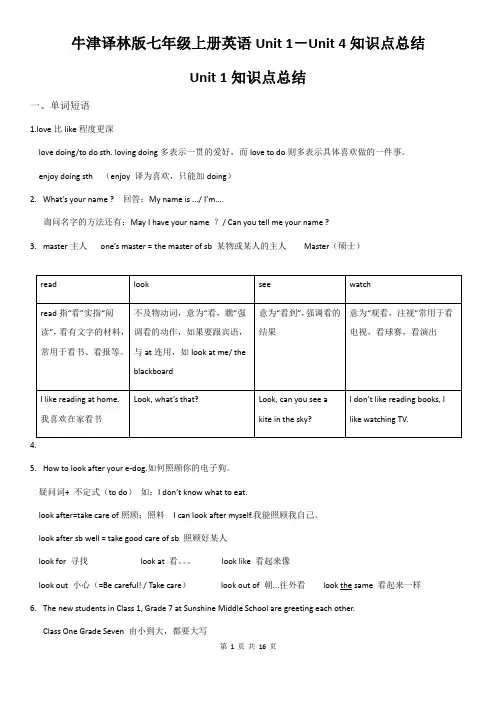
牛津译林版七年级上册英语Unit 1-Unit 4知识点总结Unit 1知识点总结一、单词短语1.love比like程度更深love doing/to do sth. loving doing多表示一贯的爱好,而love to do则多表示具体喜欢做的一件事。
enjoy doing sth (enjoy 译为喜欢,只能加doing)2.What's your name ? 回答:My name is .../ I’m....询问名字的方法还有:May I have your name ?/ Can you tell me your name ?3.master主人one’s master = the master of sb 某物或某人的主人Master(硕士)4.5.How to look after your e-dog.如何照顾你的电子狗。
疑问词+ 不定式(to do)如:I don’t know what to eat.look after=take care of照顾;照料I can look after myself.我能照顾我自己。
look after sb well = take good care of sb 照顾好某人look for 寻找look at 看。
look like 看起来像look out 小心(=Be careful! / Take care)look out of 朝...往外看look the same 看起来一样6.The new students in Class 1, Grade 7 at Sunshine Middle School are greeting each other.Class One Grade Seven 由小到大,都要大写用法相同的还有number ,lesson,unit,group,roomI’m in Grade 7.(对划线部分提问)What/ Which grade are you in?Our school has six grades.我们学校有6个年级。
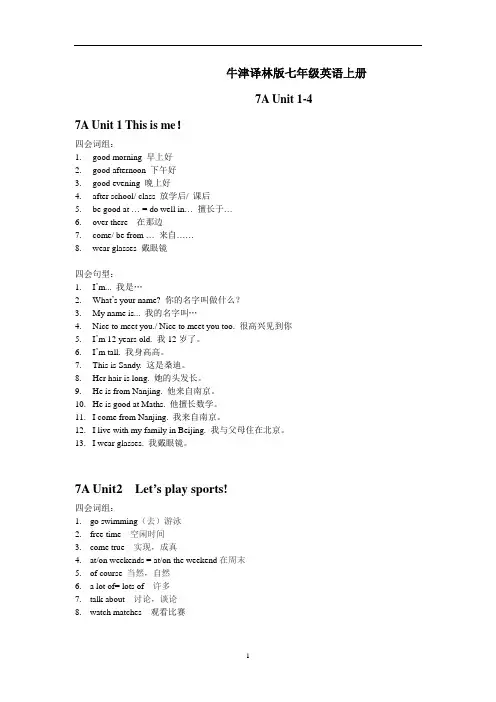
牛津译林版七年级英语上册7A Unit 1-47A Unit 1 This is me!四会词组:1.good morning 早上好2.good afternoon 下午好3.good evening 晚上好4.after school/ class 放学后/ 课后5.be good at … = do well in…擅长于…6.over there 在那边e/ be from …来自……8.wear glasses 戴眼镜四会句型:1.I’m... 我是…2.What’s your name? 你的名字叫做什么?3.My name is... 我的名字叫…4.Nice to meet you./ Nice to meet you too. 很高兴见到你5.I’m 12 years old. 我12岁了。
6.I’m tall. 我身高高。
7.This is Sandy. 这是桑迪。
8.Her hair is long. 她的头发长。
9.He is from Nanjing. 他来自南京。
10.He is good at Maths. 他擅长数学。
11.I come from Nanjing. 我来自南京。
12.I live with my family in Beijing. 我与父母住在北京。
13.I wear glasses. 我戴眼镜。
7A Unit2 Let’s play sports!四会词组:1.go swimming(去)游泳2.free time 空闲时间e true 实现,成真4.at/on weekends = at/on the weekend在周末5.of course 当然,自然6. a lot of= lots of 许多7.talk about 讨论,谈论8.watch matches 观看比赛四会句型:1.Really? 真的吗?2.I walk to my bowl many times a day.我每天都往我的碗那儿走好多次。
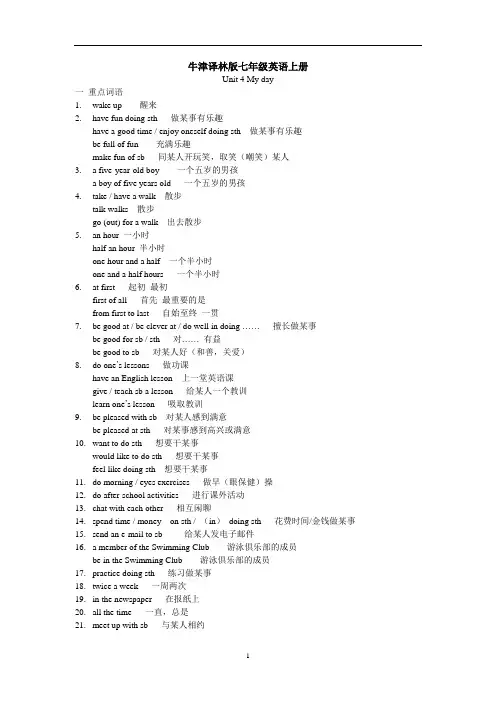
牛津译林版七年级英语上册Unit 4 My day一重点词语1.wake up 醒来2.have fun doing sth 做某事有乐趣have a good time / enjoy oneself doing sth 做某事有乐趣be full of fun 充满乐趣make fun of sb 同某人开玩笑,取笑(嘲笑)某人3. a five-year-old boy 一个五岁的男孩a boy of five years old 一个五岁的男孩4.take / have a walk 散步talk walks 散步go (out) for a walk 出去散步5.an hour 一小时half an hour 半小时one hour and a half 一个半小时one and a half hours 一个半小时6.at first 起初最初first of all 首先最重要的是from first to last 自始至终一贯7.be good at / be clever at / do well in doing ……擅长做某事be good for sb / sth 对……有益be good to sb 对某人好(和善,关爱)8.do one’s lessons 做功课have an English lesson 上一堂英语课give / teach sb a lesson 给某人一个教训learn one’s lesson 吸取教训9.be pleased with sb 对某人感到满意be pleased at sth 对某事感到高兴或满意10.want to do sth 想要干某事would like to do sth 想要干某事feel like doing sth 想要干某事11.do morning / eyes exercises 做早(眼保健)操12.do after-school activities 进行课外活动13.chat with each other 相互闲聊14.spend time / money on sth / (in)doing sth 花费时间/金钱做某事15.send an e-mail to sb 给某人发电子邮件16. a member of the Swimming Club 游泳俱乐部的成员be in the Swimming Club 游泳俱乐部的成员17.practice doing sth 练习做某事18.twice a week 一周两次19.in the newspaper 在报纸上20.all the time 一直,总是21.meet up with sb 与某人相约22.know a lot about computers 精通电脑23.go to the dancing lesson 去上舞蹈课24.be busy with / doing sth 忙于做某事25.have much time to do sth 有很多时间做某事26.say hello / goodbye to sb 向某人问好/道别27.go on a study-trip 进行一次学习旅行28.on each side of the street 在街道的每一边29.thank sb for doing sth 感谢某人做某事30.the price for ……。
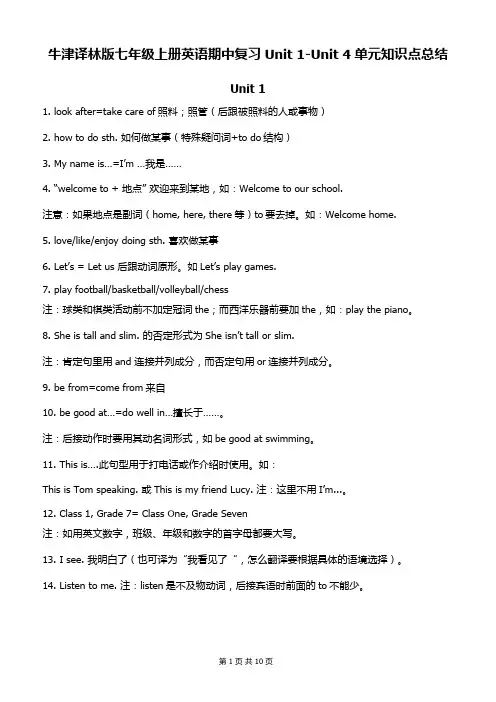
牛津译林版七年级上册英语期中复习Unit 1-Unit 4单元知识点总结Unit 11. look after=take care of照料;照管(后跟被照料的人或事物)2. how to do sth. 如何做某事(特殊疑问词+to do结构)3. My name is…=I’m …我是……4. “welcome to + 地点”欢迎来到某地,如:Welcome to our school.注意:如果地点是副词(home, here, there等)to要去掉。
如:Welcome home.5. love/like/enjoy doing sth. 喜欢做某事6. Let’s = Let us 后跟动词原形。
如Let’s play games.7. play football/basketball/volleyball/chess注:球类和棋类活动前不加定冠词the;而西洋乐器前要加the,如:play the piano。
8. She is tall and slim. 的否定形式为She isn’t tall or slim.注:肯定句里用and 连接并列成分,而否定句用or连接并列成分。
9. be from=come from来自10. be good at…=do well in…擅长于……。
注:后接动作时要用其动名词形式,如be good at swimming。
11. This is….此句型用于打电话或作介绍时使用。
如:This is Tom speaking. 或This is my friend Lucy. 注:这里不用I’m...。
12. Class 1, Grade 7= Class One, Grade Seven注:如用英文数字,班级、年级和数字的首字母都要大写。
13. I see. 我明白了(也可译为“我看见了“,怎么翻译要根据具体的语境选择)。
14. Listen to me. 注:listen是不及物动词,后接宾语时前面的to不能少。
![牛津译林版英语七年级(上册)分单元知识点归纳总结[Unit1_8]]](https://uimg.taocdn.com/0e173f3e7cd184254b353535.webp)
牛津译林版英语七年级上册全册知识点归纳总结(最新)Unit one一、词汇知识点整理:look after \ take care of 照顾 ;表示look 的短语:look after照顾look at 看…;look for 寻找look like 看起来像…on the first day 在第一天 Class One, Grade Seven (先说班级,再说年级,且大写)。
play football 踢足球 after school 放学后be\come from 来自 be good at \do well in 擅长fly kites 放风筝 go home 回家listen to music 听音乐 play a game 玩游戏wear glasses 戴眼镜 at school 在学校all the lessons 所有的课程 talk about 谈论over there 那里 a lot of hobbies 许多爱好二、结构用法:love\like doing sth 喜欢做某事let’s +动词原形让我们I am\My name is 我叫welcome to +地点欢迎来到This is 这是be good at \do well in doing 擅长做in Class…Grade…在几年级几班be from = come from + 地点, 意思是“来自某地”。
He is from Nanjing. P8 他来自南京。
live with…in…和谁住在哪里live with sb 和某人住一起;live in+ 城市名,住在某地; live on the ground floor 住在一楼(用介词on)I’m …year old. 我几岁了。
year(s) old ,……岁,如果数词大于1, year 要用复数years.问年龄要用How old “几岁”提问。
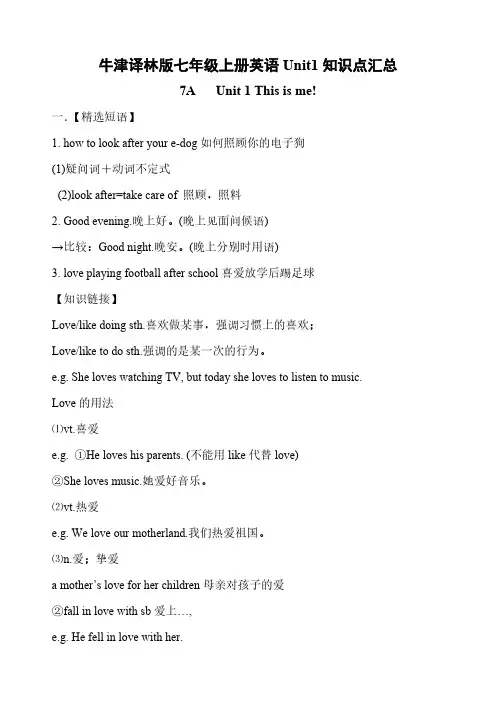
牛津译林版七年级上册英语Unit1知识点汇总7A Unit 1 This is me!一.【精选短语】1. how to look after your e-dog如何照顾你的电子狗(1)疑问词+动词不定式(2)look after=take care of 照顾,照料2. Good evening.晚上好。
(晚上见面问候语)→比较:Good night.晚安。
(晚上分别时用语)3. love playing football after school喜爱放学后踢足球【知识链接】Love/like doing sth.喜欢做某事,强调习惯上的喜欢;Love/like to do sth.强调的是某一次的行为。
e.g. She loves watching TV, but today she loves to listen to music. Love的用法⑴vt.喜爱e.g. ①He loves his parents. (不能用like代替love)②She loves music.她爱好音乐。
⑵vt.热爱e.g. We love our motherland.我们热爱祖国。
⑶n.爱;挚爱a mother’s love for her children母亲对孩子的爱②fall in love with sb爱上…,e.g. He fell in love with her.③我们可在书信的结尾处看到例如Love Mary这样的署名,意思是With my love, Mary,一方面表示情感,一方面表示道别。
【用法拓展】lovely美丽的;可爱的e.g. lovely hair秀发,a lovely girl美丽的少女4. be good at sth/doing sth=do well in sth/doing sth擅长;在某方面表现好【知识链接】⑴He is good at telling funny jokes.⑵She always does well in English.5. wear glasses戴眼镜→ wear后接服装、装饰品等,表示“穿、戴”。
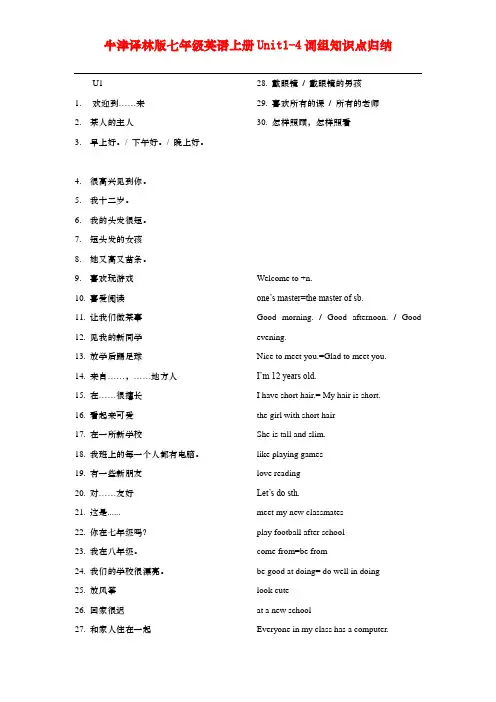
U11.欢迎到……来2.某人的主人3.早上好。
/ 下午好。
/ 晚上好。
4.很高兴见到你。
5.我十二岁。
6.我的头发很短。
7.短头发的女孩8.她又高又苗条。
9.喜欢玩游戏10.喜爱阅读11.让我们做某事12.见我的新同学13.放学后踢足球14.来自……,……地方人15.在……很擅长16.看起来可爱17.在一所新学校18.我班上的每一个人都有电脑。
19.有一些新朋友20.对……友好21.这是......22.你在七年级吗?23.我在八年级。
24.我们的学校很漂亮。
25.放风筝26.回家很迟27.和家人住在一起28.戴眼镜/ 戴眼镜的男孩29.喜欢所有的课/ 所有的老师30.怎样照顾,怎样照看Welcome to +n.one’s master=the master of sb.Good morning. / Good afternoon./ Good evening.Nice to meet you.=Glad to meet you.I’m 12 years old.I have short hair.= My hair is short.the girl with short hairShe is tall and slim.like playing gameslove readingLet’s do sth.meet my new classmatesplay football after schoolcome from=be frombe good at doing= do well in doinglook cuteat a new schoolEveryone in my class has a computer.have some new friendsbe nice to sb.=be kind to sb.=be friendly to sb. This is...Are you in Grade 7?I am in Grade 8.Our school is nice.fly kitesgo home latelive with my familywear glasses / the boy with glasseslike all the lessons / all the teachershow to look after=how to take care of7A Unit 21. 步行去某地2. 一天很多次3. 喜欢打排球4. 擅长打网球5. 你最喜欢的运动是什么?6. 我每周去游泳。
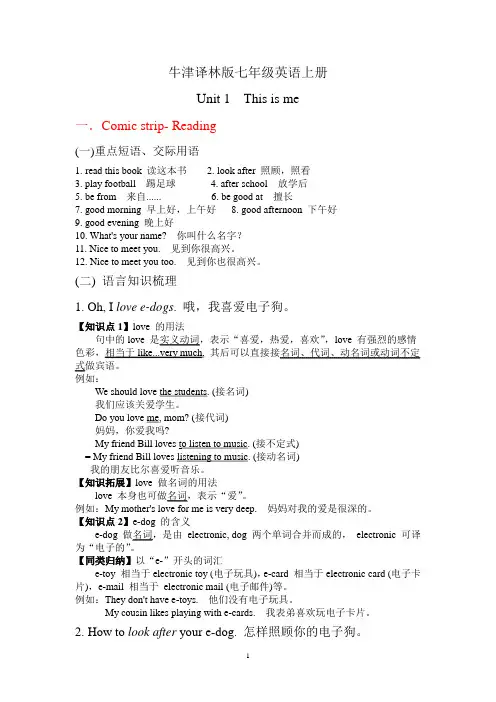
牛津译林版七年级英语上册Unit 1 This is me一.Comic strip- Reading(一)重点短语、交际用语1.read this book 读这本书2. look after 照顾,照看3. play football 踢足球4. after school 放学后5. be from 来自......6. be good at 擅长7. good morning 早上好,上午好8. good afternoon 下午好9. good evening 晚上好10. What's your name? 你叫什么名字?11. Nice to meet you. 见到你很高兴。
12. Nice to meet you too. 见到你也很高兴。
(二) 语言知识梳理1. Oh, I love e-dogs. 哦,我喜爱电子狗。
【知识点1】love 的用法句中的love 是实义动词,表示“喜爱,热爱,喜欢”,love 有强烈的感情色彩,相当于like...very much, 其后可以直接接名词、代词、动名词或动词不定式做宾语。
例如:We should love the students. (接名词)我们应该关爱学生。
Do you love me, mom? (接代词)妈妈,你爱我吗?My friend Bill loves to listen to music. (接不定式)= My friend Bill loves listening to music. (接动名词)我的朋友比尔喜爱听音乐。
【知识拓展】love 做名词的用法love 本身也可做名词,表示“爱”。
例如:My mother's love for me is very deep. 妈妈对我的爱是很深的。
【知识点2】e-dog 的含义e-dog 做名词,是由electronic, dog 两个单词合并而成的,electronic 可译为“电子的”。
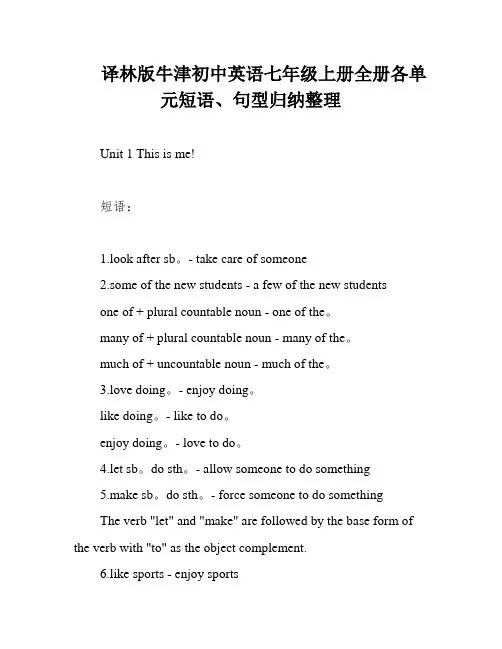
译林版牛津初中英语七年级上册全册各单元短语、句型归纳整理Unit 1 This is me!短语:1.look after sb。
- take care of someone2.some of the new students - a few of the new studentsone of + plural countable noun - one of the。
many of + plural countable noun - many of the。
much of + uncountable noun - much of the。
3.love doing。
- enjoy doing。
like doing。
- like to do。
enjoy doing。
- love to do。
4.let sb。
do sth。
- allow someone to do something5.make sb。
do sth。
- force someone to do somethingThe verb "let" and "make" are followed by the base form of the verb with "to" as the object complement.6.like sports - enjoy sports7.after class - after the classin class - during the class8.be good at (doing)。
- be skilled at (doing)。
9.meet my new friends - meet my new classmates10.over there - in that n11.tell sb。
about sth。
- inform someone about something12.Oh。
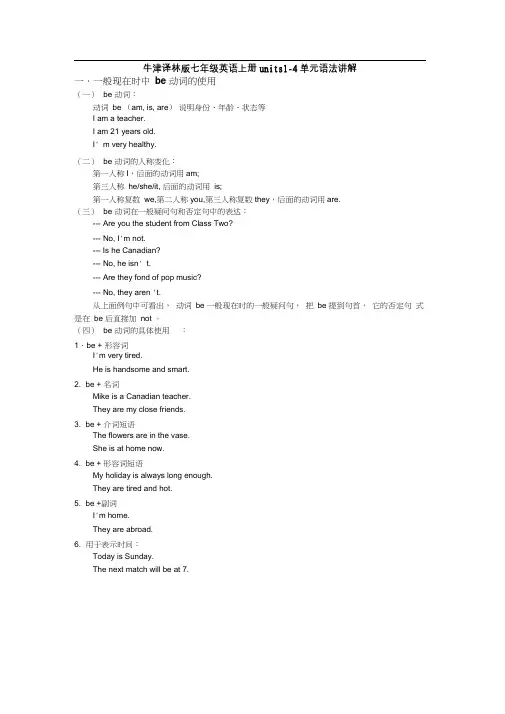
牛津译林版七年级英语上册units1-4单元语法讲解一.一般现在时中be 动词的使用(一)be 动词:动词be (am, is, are)说明身份、年龄、状态等I am a teacher.I am 21 years old.I' m very healthy.(二)be 动词的人称变化:第一人称I,后面的动词用am;第三人称he/she/it, 后面的动词用is;第一人称复数we,第二人称you,第三人称复数they,后面的动词用are.(三)be 动词在一般疑问句和否定句中的表达:--- Are you the student from Class Two?--- No, I'm not.--- Is he Canadian?--- No, he isn' t.--- Are they fond of pop music?--- No, they aren 't.从上面例句中可看出,动词be 一般现在时的一般疑问句,把be 提到句首,它的否定句式是在be 后直接加not 。
(四)be 动词的具体使用:1.be + 形容词I'm very tired.He is handsome and smart.2. be + 名词Mike is a Canadian teacher.They are my close friends.3. be + 介词短语The flowers are in the vase.She is at home now.4. be + 形容词短语My holiday is always long enough.They are tired and hot.5. be +副词I'm home.They are abroad.6. 用于表示时间:Today is Sunday.The next match will be at 7.二•一般现在时中行为动词的使用1. 一般现在时:用于谈论我们经常做的事;目前的状态;目前的爱好、能力;客观事实;真理。
牛津译林版七年级上册英语各单元语法知识点复习提纲Unit1 Dream homes【重点词汇】1. shareshare作及物动词,意为“分享”。
常用结构:share sth. with sb.意为“和某人合用某物;和某人分享某物”。
如:I'm afraid you have to share a table with others.我恐怕你得和别人合用一张桌子。
I often share my snacks with my classmates.我经常和同学分享零食。
2. dreamdream作名词时,意为“梦,梦想”;作形容词时,意为“理想的,不切实际的”;作动词时,意为“做梦”,常用于结构:dream of/about...(梦到……)或dream of/ about doing sth.梦想做某事。
如:Millie has a dream to have a big house米莉梦想拥有一幢大房子My dream house is a house with a big garden.我梦寐以求的房子是一幢带有大花园的房子。
I dreamed of my English teacher last night.我昨晚梦到了我的英语老师Amy dreams of being a singer when she grows up.埃米梦想长大后成为一名歌手。
3. ownown作形容词.意为“自己的,属于自己的”,常和形容词性物主代词连用,构成短语of one'sown,表示“属于某人自己的”,on one's own = alone,意为“独自地”。
own作动词时,表示“拥有”。
如:I have my own computer我有属于我自己的电脑。
That's a car of her own.那是她自己的汽车。
He lives on his own.他一个人生活。
7A 短语和句子n.名词v.动词vt.及物动词vi.不及物动词adj.形容词adv.副词prep.介词pron.代词conj.连词Unit 1 This is me1.look after sb. 照顾某人2.some of the new students 新学生中的一些one of + 可数名词复数…..中的一个many of + 可数名词复数…..中的许多.much of + 不可数名词…..中的许多3.love doing…. 热爱/喜爱做….like doing….喜爱做….enjoy doing…. 喜欢/享受做…sb. do sth. 让某人做某事5.make sb. do sth. 使某人做某事使役动词let, make后面接省to的动词不定式充当宾语补足语、6 like sports 喜爱运动7 after class 课后in class 在课上8. be good at doing…… 擅长做某事=do well in doing……my new friends 见见我的新同班同学there 在那边11. tell sb. about sth. 告诉某人关于某事12. Oh, I see. 哦,我明白了;13. wear glasses 戴着眼镜14. like all the lessons 喜欢所有的功课15. need作为行为动词的用法:need to do don’t / doesn’t need to do16.twelve years old 12岁17. \come from 来自于句子:1.How to look after your e-dog.如何照顾你的电子狗;2.I have short hair. = My hair is short. 我短发;3.Let’s meet my new classmates. 让我们见见我的新同学;4. She is tall and slim. 她高而苗条;5. Daniel is from Nanjing. Daniel来自南京;=Daniel comes from Nanjing.6. She loves dancing. 她热爱舞蹈;7. She is good at swimming. 她擅长游泳; = She does well in swimming.8. This is my cousin Andy. 这是我的表弟Andy.9. Andy, this is my new classmate Kitty. Andy, 这是我的新同学Kitty.10. I come from Nanjing, but now I live with my family in Beijing.我来自南京,但现在我和父母住在北京;11. They are all very nice. 他们都很好;Unit 2 Let’s play sports1. play sports 做运动 6. Walk to my bowl 走到我的碗边2. like walking 喜欢散步go for a walk 去散步take a walk 散步3. enjoy oneself = have a good time 玩得开心= have fun = play happily4. be free 有空be busy 繁忙5. hope to do sth. 希望做某事hope that + 句子希望+ 宾语从句7. come true 梦想实现,成为现实8. at/on weekends = at / on the weekend 在周末9. of course = certainly = sure 当然10. Many of my students 我的许多学生11. else 放在不定代词或疑问代词之后something else 别的东西what else 别的什么,还有什么12. a lot of = lots of 许多修饰可数名词、不可数名词some 一些修饰可数名词、不可数名词many 许多修饰可数名词much 许多修饰不可数名词13. fun 不可数名词乐趣、享乐、有趣的事What great fun 多么有趣的事啊14. talk about 谈论talk of 谈到,说到15. hero – heroes16. many times a day 一天很多次once a week 一周一次twice a month 一月两次tree times a year 一年三次17.my favourite football player 我最喜爱的足球队员18. a new member of Huanghe Football Club黄河足球俱乐部的一个新成员19. look strong 看起来强壮20. play football very well 足球踢得很21. in one’s free time 在某人的空余时间里22. enjoy listening to music 喜欢听音乐23. make sb. do sth. 使某人做某事make sb. + adj. 使某人……make him happy 使他们开心make me sad 使我悲伤24. activity ---- activities 活动25. watch ball games on TV 在电视上看球赛26. 对sometimes, often, usually, always, never, once a week, twice a month等表示频率的词或短语提问用how often / how about ……怎么样句子:1. Are you free = Do you have time 你有空吗2. What’s your favourite sport 你最喜欢的运动是什么3.He also enjoys listening to music. 他也喜欢听音乐;4. Li Hua wants to play in the next World Cup. 李华想参加下届世界杯;5.I hope his dream comes true. 我希望他的梦想实现;6.How does he look 他看上去怎样What does he look like 他看上去像什么7. Do your parents go with you你父母和你一起去吗8. My dad sometimes watches our games. 我爸爸有时候观看我们的比赛;9. My mum often shops at weekends. 我妈妈常在周末购物;10. I often stay at home. 我常待在家里;11. Many of my students like sports我学生中的许多喜欢运动;/我的许多学生喜欢运动;12. What else do you like to do你还喜欢做别的什么事吗13. It makes me feel great. 它使我感到很棒;14. I like reading too. 我也喜欢阅读;15. Me, too. Reading is fun. 我也是;阅读很有趣;16. I often play basketball with my friends after school. 我常在放学后与朋友一起打篮球;Unit 3 Welcome to our schoolthe Open Day 在开放日 2. be ready to do…. 准备好做….parents’ meeting 家长会4. at the school gate=at the gate of the school在学校大门口5. so big 如此大6. watch two of our lessons 观摩我们的两节课7. let me show you around 让我带你参观the ground floor 在一楼英9. this way 这边走10. by the way 顺便说说,顺便问一下11. have a meeting / have meetings at the school hall 在学校礼堂开会12. classroom building 教学楼14. be nice / kind to sb. 对某人好15. It’s very nice/kind of you to do sth.你做某事真好a diary diaries 写日记17. want to say hello to sb. 想向某人问好18. say goodbye to sb. 向某人告别say sorry to sb. 向某人道歉19. get to school 到达学校20. take the bus to school 乘公交车上学=go to school by bus=go to school on a / the bus21. ride a bike to school 骑自行车上学=go to school by bike=go to school on one’s bike23. live near the school 住学校附近24. live far away from the school 住得远离学校25,all kinds of books 各种可样的书26. borrow sth. from sb. 跟某人借某物27. borrow books from the library从图书馆借书28. on one’s way back 在某人回来的路上29. on one’s way home 在某人回家的路上30. on one’s way to school 在某人上学的路上31. Thank sb. for sth. 因为某事谢谢某人32. Thank sb. for doing sth. 为干某事谢谢某人you / Thanks for telling me how to have a party.谢谢你告诉我怎样举办一个晚会;34. all the best 一切顺利,万事如意35. write to sb. 给某人写信=write a letter letters to sb.句子:1. What’s your favourite subject=What subject do you like best2. Which of the subjects do you like best 这些科目中你最喜欢哪个’s the date today 今天几号=What date is it today’s that man in a white shirt 穿白衬衫的那个人是谁5. Our school is really nice. 我们学校真好;6. I can’t hear you well on the phone.在电话里我听不清你的话;7. It’s a long way from my home to the school.从我家到学校有很长一段路;8. The reading room is open. 阅览室是开着的9. ----When is it open 它什么时候开放-----It’s open from 8 . to 5:30 它从早上8点到下午5点半开放;10. It takes me about an hour to get to school.我到达学校大约要花费一个小时;11. What school do you study at你在哪个学校学习Unit 4 My day1. wake up 醒来2. between...and... 在...和...之间3. It’s time for sth. It’s time for sb. to do sth. 是某人干某事的时候了4. go walking in the hills 去山上散步5. seldom go out 很少外出6. need a good rest 需要好好休息=need to have a good rest7. need to do sth. 需要做某事8. From Monday to Friday 从周一到周五9. do morning exercises 做早操10. do eye exercises 做眼保健操11. do some exercise 锻炼12. have lessons 上课13. start begin lessons 开始上课14. do after-school activities 做课外活动15. be never late for work / school 上班/ 上学从不迟到16. one of ….. …….之一;后接可数名词复数17. be all nice to sb. 都对某人很好18. chat with sb. 和某人聊天19. chat with each other 互相聊天20. help each other 互相帮助21. play in the playground 在操场上玩22,be in the school volleyball team是校排球队成员=be a member of the school volleyball team23. practise after school 放学后训练practise doing sth. 练习/训练做某事24. on Wednesday afternoon 在周三下午25have a good time doing sth=have fun doing sth. 做某事过得愉快26. in spring / summer / autumn / winter 27. at 6 years old =at the age of 6 在六岁28. all the best 一切顺利,万事如意29. have much time to do sth. 有很多时间做某事30. have no time to do sth. 没有时间做某事31. go to her dancing lessons 去上舞蹈课32. dance for half an hour 跳舞半小时33. go roller skating 去溜旱冰34. visit a museum 参观博物馆on picnics with my family twice a month 一个月两次和我家人去野餐36..be good for sb. 对...有益37..be bad for sb. 有…..害38. get ready for sth 为...做好准备get ready to do sth 准备好做某事=be ready to do sth.39.. learn a lot about sth 关于某事了解很多40.. learn more about sth. 关于某事了解更多41. too much homework 太多作业42. too many lessons 太多课43. much too cold hot太冷热句子:1. Some dogs just don’t know how to have fun. 有些狗就是不知道怎样玩乐;2. What time do you start lessons 你们什么时候开始上课3. Our lessons begin at a quarter past eight. 我们的课于8:15开始;4.We have a Reading Club. 我们有一个阅读俱乐部;5.I also like playing volleyball. 我也喜欢打排球;6. We always have a good time at school.我们在学校总是过得很开心;7. Millie seldom chats with her friends after 很少与朋友在课后闲聊;8. I would like to tell you about my life here我想告诉你我在这儿的生活;9. We do not have lessons on Saturday or Sunday. 我们在周六和周日不上课;10. How often do they exercise 他们多久锻炼一次11. I hope everyone can come and watch the game. 我希望每个人能来看比赛;Wish our team good luck 祝我们队好运They help us get ready for the day他们帮助我们为一天做好准备;Unit 5 Let’s celebrateup 打扮 2.. dress up as a ghost 乔装打扮成鬼a guess 猜一猜 4. at Christmas = on Christmas Day 在圣诞节Festival中秋节 6. enjoy the full moon赏满月7. knock on / at people’s doors 敲人们的门8. play a trick on sb. / play tricks on sb.捉弄某人9. seem + adj. He seems very happy. seem to do… He seems to be very happy.He seems to like apples. It seems that + 句子; It seems that he is very happy. 他似乎很开心;10. be different from… 与…不同11 wear masks 戴面具12. have a party 开派对13. learn about different festivals around the world 了解全世界不同的节日14. a special day 特别的一天15. make pumpkin lanterns 做南瓜灯16. make lanterns out of pumpkins 把南瓜做成灯houses 串门18.. play a game with the people inside和里面的人做一个游戏dance 舞狮out 找到,发现 a lot of photos 拍很多的照片the world = all over the world全世界23. paint one’s face 给脸涂色24. on the evening of….. 在…..的晚上us some candy as a treat 给我们一些糖果作为招待= give us a treat of candy26 fun 不可数名词much fun 很多乐趣have lots of fun = have great fun 玩得开心What great fun 多么大的乐趣27. on Halloween 在万圣节前夕28. at a restaurant near my home 在我家附近的一家餐馆29. some other nice things 一些别的好东西30. what other things = what else 别的什么东西31. on the radio 在收音机里32 let off fireworks 放烟火33. watch the fireworks 看烟火34. a music and dance show一场音乐舞蹈表演35. most Chinese families 大多数中国家庭36.. at this time of year 在一年的这个时候句子1. Let’s celebrate. 让我们庆祝;2. What is your favourite festival =What festival do you like best 你最喜欢的节日是什么3. All my family get together and have a big dinner. 我所有的家人聚集在一起吃大餐;4. Thank you for telling me about the Mid- Autumn Festival. 谢谢你告诉我中秋节的情况;5. Children have lots of fun on that day. 在那天孩子们有很多的乐趣;’s really a special day. 这真是特殊的一天;7. Family members get together and give each other presents. 家庭成员聚集在一起并互送礼物;8. How do you usually celebrate your birthday 你通常怎样过生日9. What do you get as birthday presents 你得到什么作为生日礼物10. The Spring Festival is an important festival in China. 在中国春节是个重要的节日;11. I am on holiday in New York. 我在纽约度假;12. What do you do to celebrate the Chinese New Year in Beijing 你们在北京做什么事庆祝春节13. There is a great Spring Festival Gala on TV every year. 电视上每年都有盛大的春节联欢晚会;14. Children have lots of fun on this day. 孩子们在这一天玩得很开心;15. Usually our parents get new clothes ready for us. 我们的父母为我们准备好新衣服;16. We get red packets from our parents. 我们从父母那得到压岁钱;17. They are really wonderful. 他们真的很精彩Unit 6 Food and lifestyle1. all kinds of food 各种各样的食物2. keep fit = keep healthy 保持健康……away 远离4. plan to do… 计划做…planning5. more than 超过,多于6. dance for half an hour every day每天跳舞半小时7. feel hungry between meals在两餐之间感到饿8. Too much sugar 太多糖my lifestyle 改变我的生活方式swimming pool 一个游泳池11. four kilos of meat 四公斤肉12. five cartons of milk 五盒牛奶13. how to keep fit 如何保持健康14. less than 3 times a week 少于一周三次three to six times a week 一周三到六次15.exercise more 多运动16.eat less 少吃17.Have a look 看一看18. take a walk 散步19. All right,好的,行the day well 很好的开始一天21. taste good 尝起来不错;此处taste 为系动词22.. have a healthy lifestyle 有一个健康的生活方式句子1. It’s good for our health. 这对我们的健康有益;2. Healthy food is important for me.= It’s important for me to have healthy food.健康食物对我很重要;/对于我来说吃健康食物很重要;3. They have too much sugar and are bad for my teeth. 他们有太多的糖并对我的牙齿有害;4. I need to change my lifestyle now. 现在我需要改变我的生活方式;5. I plan to eat more fruit and vegetables every day. 我计划每天吃更多水果蔬菜;6. You need to exercise more and eat more healthy food.你需要多加锻炼并多吃健康食品;7. I seldom eat cakes or sweets. 我很少吃蛋糕和糖果;7. Let me have a look at the menu. 让我看一看菜单;8. What would you like to order 你们想要点什么9. Apple juice tastes good. 苹果汁尝起来不错;10. I often play football to keep fit. 我常踢足球保持健康;helps me start the day well. 这帮助我很好的开始一天;12. This meal gives me energy for the whole afternoon. 这顿饭为我整个下午提供能量;13. We need them to keep healthy. 我们需要他们来保持健康;14.. An apple a day keeps the doctor away. 一天一苹果,医生远离我;Unit 7 Shopping1. come with me 跟我来2. need sb. to do sth. 需要某人做某事3. flower / shoe /gift shop 花/鞋/礼品店clothes / sports shop 服装店/体育用品商店4. go shopping = do some shopping = buy some things 购物/买东西5. hate doing…/ hate to do…. 讨厌做….6. be interested in doing sth. 对做…感兴趣the street 沿着这条街8. be sure 确信、相信9. just a minute = wait a minute = wait a moment = wait for a short time 稍等片刻10.enough修饰adj./adv.时喜欢放在后good enoughenough修饰n.时常放在前面enough moneyall the bags 拎所有的包12. wait for….. 等待…13. be different from… 与….不同14. the same as…. 与…一样15. another 又一,另一,用于三者或以上a look看一看much 多少钱18. price用高、低high, low形容,不用贵、便宜形容19. . buy Simon a present 买给西蒙一个礼物= buy a present for Simon 为西蒙买一个礼物20. last year’s cards 去年的卡片21. different kinds of hair clips 不同种类的发卡22. go well with… 与…很配23. help the children in some poor areas帮助一些贫困地区的孩子24. walk a long way to school 走很长的路上学25. try on 试穿26. one floor of restaurants 一个楼层的饭馆27.. on the top floor 在顶楼句型1.There’s a new mall down the street.沿着这条街走有一个新建的大型购物中心;2.What can I help you/Can I help you您需要什么3.How much do they costHow much are they他们多少钱’ll take /buy them.我就买它们;5.. Not far away from my school, there is also a supermarket. 离我学校不远也有个超市;need books most. 他们最需要书;7.. We can use our pocket money to buy them these things. 我们可以用零用钱买给他们这些东西;8. Thank you for your help. 谢谢你的帮助;9.. What’s your size Size 40. 你穿几码40码;10.. They fit very well. 他们很合适;11. Can we see another pair 我们可以再看一双吗12.. There are five floors of shops. 有五层楼的商店;13. There are foods from different areas. 有来自不同地区的食物;14.. The mall is a good place to meet friends and have fun.这个购物中心是与朋友见面和玩乐的好地Unit 8 Fashion1. spend +时间/钱+ on sth. 花时间/钱在..上.spend +时间/钱+ in doing sth.花时间、钱做某事2. so lazy 如此懒惰3.. sports clothes 运动服4. lend sth. to sb. = lend sb. sth.把某物借给某人5.. borrow sth. from sb. 跟某人借某物6.. between ….and …在...与…之间用于两者之间7. be made of… 由….制成能看出原材料be made from…由….制成不能看出原材料be made in + 地点产于某地be made by + 人被…制造8.下列的fit 为adj. be fit for …. 适合于…They are fit for a long walk. 他们适合长时间步行14. 下列fit为v. They fit me very well. 他们很适合我;The coat doesn’t fit me.那件外套不适我;15. ten more minutes = another ten minutes 再多10分钟16. hold / have/ give a fashion show 举办一个时装展17. design a poster for the “Fashion Wall”给Fashion Wall设计一张海报18. show you different styles of clothes给你看不同式样的衣服19. look smart / modern and beautiful 看起来时尚和漂亮20.. look great in white创白色很棒21. both of them 他俩都22. a black wool skirt 一件黑色羊毛短裙23. a pair of long red leather boots 一双红色长筒皮靴24. 感叹句的构成:1、What + n.短语+ 主语+ 谓语What a great show it is 这是多棒的表演啊What tall buildings they are 他们是多高的楼啊What fine weather it is 这是多好的天气啊2、How + adj./adv. + 主语+ 谓语How great the show is 表演多棒啊How tall the buildings are 这些楼多高啊How fine the weather is 天气多好啊25.most young people 大多数年轻人26. wait for the school bus 等校车27. lie on the bed 躺在床上28. go for a dinner 去赴宴29. have to do sth. 必须/不得不做某事30. feel soft and smooth 摸上去柔软光滑句型1. What do you think of …. = How do you like ….. 你认为….怎么样2. I’m thinking about what to wear. = I’m thinking about what I should wear.我正考虑穿什么3. I can spend ten more minutes in bed then. 那么我可以在床上多待10分钟了;4. Would you like one more apple = Would you like another apple 你想再要一个苹果吗5. Can you lend us your red blouse for our fashion show, Mum妈妈,你能把你的红衬衫借给我们参加时装表演吗6. What size is your blouse Size 4. 你的衬衫是什么尺寸大小4;7. Trainers are light and comfortable and are popular among young people.8. Here comes Simon. 西蒙走来了;9. That’s all for today’s show.= So much for today’s show. 今天的表演到此结束;for coming. 感谢光临;11. You look great in your purple shirt. 你穿紫色衬衫看起来棒;12. The purple shirt looks great on you. 紫色衬衫穿在你身上看起来棒;13. That pair of long boots is made of leather. 那双长靴是皮革制成的;14. The jacket is not too long or too large. 这夹克不太长也不太大;15. My design includes a pair of blue jeans. 我的设计包括一条蓝色牛仔裤;。
Unit1 知识点汇总Wele to the unit and ic strip1.Oh, l love edogs. 哦,我喜欢电子狗。
love v. 喜爱,钟爱(重点掌握)搭配:love doing(动词的ing形式)sth 喜欢做某事类似的搭配:like/love/enjoy doing sth 喜欢某事或者干某事(爱好)存在love to do sth以及like to do sth, 这些词组意思就是一时兴起做某事,做这个事情时间不长。
<翻译练习>她喜欢早上阅读一些书籍。
She likes reading some books in the morning.(她喜欢早上阅读一些书籍。
)edog n.电子狗e是electronic的简写例子:email(电子邮件), ebook (电子书)<启东作业本P1 一(8)>I _______(喜欢)eating icecream on a hot day. It tastes good.答案:love/like2.She likes music. 她喜欢音乐。
(问喜欢什么东西):What does she like?(问喜欢干什么):What does she like doing?3.My name is Hobo. 我的名字叫Hobo。
(重点掌握)(一般疑问句及肯定和否定回答)例子:(1)Is your name Hobo?(这边是对Hobo的名字进行提问,而不是对Hobo这个人进行提问)Yes, it is. No, it isn’t(2)Are you my master?Yes, I am. No, I am not.<第一次周练一(15)>(D)Is your name Daniel?________.What about yours?A.Yes, I am.B.No,he isn’tC.No, I’m notD.Yes, it is.4.Now let’s read this book.现在读读这本书吧。
牛津译林版七年级英语上册Unit1-Unit4必备句型词组整理汇总7A U1-4必背词组句型Unit 11.照顾:look after=take care of2.早上好:good morning3.下午好:good afternoon4.晚上好:good evening.5.晚安:good night6.一个新学生:a new student7.欢迎来到七年级一班:welcome to Class 1,Grade 78.在阳光中学:at Sunshine Middle School.9.喜爱阅读:love reading 10.让我们做某事:let’s do sth11.会见我的新同学们:meet my classmates 12.踢足球:play football 13:放学后:after school 14.在那边:over there15:她的头发是长的(两句):(1)Her hair is long. (2)She has long hair16:他来自南京:(1)He comes from Nanjing. (2)He is from Nanjing.17.他擅长数学:(1) He is good at Maths. (2) He does well in Maths.18.很高兴见到你(两句):(1) Glad to meet you. (2) Nice to meet you.19:在八年级:in Grade 8 20:听音乐:listen to music21.放风筝:fly kites 22.喜欢玩游戏:like playing games 23.回家迟:go home late 24:来自南京:come from Nanjing.25.和我家人住在北京:live with my family in Beijing.26:戴眼镜:wear glasses27.所有的功课:all the lessons 28.在学校:at schoolUnit 229.走向我的碗:walk to my bowl=go to my bowl on foot30.一天许多次:many times a day31:喜欢做某事:love /like/enjoy doing sth32.你最喜欢的运动是什么(两句):(1) What’s your favourite sport? (2)What sport do you like best?33.放学后踢足球:play football after school34.去游泳/跑步/购物:go swimming/running/shopping35.李华是我最喜欢的足球明星:Li Hua is my favourite football star.36.他是黄河足球俱乐部的一名新成员(两句):(1) He is a member of Huanghe Football Club. (2) He is in Huanghe Football Club.37.看起来强壮:look strong 38.足球踢的很好:play football very well39.在他的空闲时间:in his free time 40.喜欢听音乐:enjoy listening to music41.让他开心:make him happy 42.想要做某事:want to do sth43.想要某人做某事:want sb to do sth 44.在下一届世界杯中:in the next World Cup.45.我希望他的梦想可以成真:I hope his dream comes true.46.他看起来怎么样:How does he look?47.在电视上看球类比赛:watch ball games on TV.48.走路去学校(两句):walk to school=go to school on foot.49.在周末(4种):on/ at the weekend on/at weekends50.当然:of course 51.阅读是有趣的事:Reading is fun.52.你还喜欢做些其他的什么事:What else do you like to do ?53.它让我感觉非常好:It makes me feel great.54 .读很多有趣的书:read a lot of interesting books.55.我们学校篮球队的一名成员: a member of our school basketball team. 55.放学后和我的朋友打篮球:play basketball with my friends after school.57.在电视上看篮球比赛:watch basketball matches on TV.58.他是我的偶像:He is my hero. 我的偶像之一one of my heroesUnit 359.你最喜欢的学科是哪个(两句):Which is your favourite subject? = Which subject do you like best?60.今天是几月几号:What’s the date today?61.学校开放日:School Open Day62.几点了:What’s the time?/ What time is it?63.家长会:the parents’ meeting 64.在两点钟:at two o’clock.65.在下午:in the afternoon 66.带领某人参观:show sb around67.听我们两节课:watch two of our lessons68.在校门口见面:meet at the school gate69.在……前面: in front of 70.教学楼:the classroom building71.在第一层:on the ground floor72.教室是干净的和明亮的:The classrooms are clean and bright.73.一间美术室:an art room 74.两间机房:two computer rooms75.在那边:over there 76.学校礼堂:school hall77.开会:have meetings 开一次会议have a meeting78.穿白色衬衫的那个男人:that man in a white shirt79.让我们去礼堂:Let’s go to the hall80.在开放日:on the Open Day81.我的朋友们的照片:pictures of my friends82.在墙上:on the wall 83.让我看看:let me see84.在我们学校足球队:in our school football team.85.告诉某人关于某事:tell sb about sth86.有一些新朋友:have some new friends 87.课后:after class88.和某人打招呼:say hello to sb 89.在电话里:on the phone90.从我家到学校是一段很长的路程:It is o long way from my home to the school.91.起床:get up 92.到学校:get to school93.到达学校花了她20分钟的时间:It takes her about 20 minutes to get to school.94.从上午八点到下午五点半:from 8 a.m to 5:30 p.m95.各种各样的书:all kinds of books 96.在我们的图书馆:in our library97.从图书馆借书:borrow books from the library98.谢谢你的信:Thanks for your letter.99.在希望中学: at Hope Middle School100.有一些教室:have a few classrooms101.住的离学校很远:live far away from the school102.步行去学校: go to school on footUnit 4103.醒来:wake up 104.是吃早饭的时间了吗:Is it time for breakfast?105.我们去山中散步好吗:Shall we go walking in the hills?106:很少出去:seldom go out107.吃中饭/早饭/晚餐:have lunch/breakfast/dinner108.需要好好休息:need a good rest 109.如何玩得高兴:how tohave fun110.起床:get up 111.做晨练:do morning exercises112.上课:have lessons 113.进行课后活动:do after-school activities114.做家庭作业:do homework 115.上床睡觉:go to bed116.我从不迟到:I’m never late for it117.在八点一刻:at a quarter past eight. 118.在早上:in the morning 119.从星期一到星期五:from Monday to Friday120.我最喜欢的学科是英语:My favourite subject is English.121.互相聊天:chat with each other 122.在操场玩:play in the playground123.有一个阅读俱乐部:have a Reading Club 125.练习做某事:practice doing sth124.在学校排球队:in the school volleyball team126.在学校玩的开心:have a good time at school127.最好的祝愿:Best wishes128.学校游泳队的一名成员: a member of the school swimming team129.在三月:in March 130.在冬天:in winter131.在2022年:in 2022 132.在星期天早上:on Sunday morning 133.在儿童节:on Children’s Day 134.在六岁:at 6 years old 135.想要做某事:would like to do sth 136.一切顺利,万事如意:all the best137.在比赛中:in the match138.希望我们的队有好运:wish our team good luck139.参观博物馆:visit the museums 140.一个月两次:twice a month 141.进行一次野餐:go on a picnic 142.一个月一次:once a month 143.一个穿着短裙的女孩: a girl in a skirt 144.为……做准备:get ready for145了解世界很多:learn a lot about the world146.有太多家庭作业:have too much homework7A U1-4必背词组句型默写Unit 11.照顾:_____________=__________________2.早上好:_________________3.下午好:_____________________4.晚上好:____________________5.晚安: ____________________6.一个新学生:___________________7.欢迎来到七年级一班:_________________________________8.在阳光中学:________________________________________9.喜爱阅读:_______________________ 10.让我们做某事:__________________11.会见我的新同学们:______________________ 12.踢足球:__________________13:放学后:_____________________ 14.在那边:_____________________ 15:她的头发是长的(两句):(1)________________________(2)________________16:他来自南京:(1)__________________________(2)________________________17.他擅长数学:(1) __________________________(2)_______________________18.很高兴见到你(两句):(1)____________________ (2)_______________________19:在八年级:________________________ 20:听音乐_____________________21.放风筝:_______________________ 22.喜欢玩游戏:____________________23.回家迟:_____________________ 24:来自南京:_________________________25.和我家人住在北京:________________________________26:戴眼镜:_________________________27.所有的功课:_________________________ 28.在学校:__________________Unit 229.走向我的碗:________________________=______________________________30.一天许多次:__________________________________________ 31:喜欢做某事:___________________________________ 32.你最喜欢的运动是什么(两句):(1)_______________________________________________________(2)__________________________________________________________ 33.放学后踢足球:________________________________________34.去游泳/跑步/购物:____________________________________________________35.李华是我最喜欢的足球明星:____________________________________________36.他是黄河足球俱乐部的一名新成员(两句):(1) __________________________________________________(2)___________________________________________________37.看起来强壮:_____________________ 38.足球踢的很好:__________________________39.在他的空闲时间:__________________ 40.喜欢听音乐:___________________________41.让他开心:_______________________ 42.想要做某事:_________________________43.想要某人做某事:________________ 44.在下一届世界杯中:____________________45.我希望他的梦想可以成真:________________________________46.他看起来怎么样:________________________________________47.在电视上看球类比赛:________________________________48.走路去学校(两句):___________________=___________________________49.在周末:__________________________________________________________________50.当然:____________ 51.阅读是有趣的事:_________________________52.你还喜欢做些其他的什么事:_______________________________________53.它让我感觉非常好:_______________________________________54 .读很多有趣的书:____________________________________________55.我们学校篮球队的一名成员:________________________________________________55.放学后和我的朋友打篮球:________________________________________________57.在电视上看篮球比赛:______________________________________________________58.他是我的偶像:_______________________ 我的偶像之一____________________Unit 359.你最喜欢的学科是哪个(两句):_____________________________________________= _____________________________________________________60.今天是几月几号:______________________________________61.学校开放日:___________________________________62.几点了:__________________________=__________________________________ 63.家长会:__________________________ 64.在两点钟_____________________65.在下午:____________________ 66.带领某人参观:____________________67.听我们两节课:____________________________________68.在校门口见面:________________________________________________69.在……前面:__________________________70.教学楼:______________________71.在第一层:_____________________________72.教室是干净的和明亮的:________________________________________________73.一间美术室:______________________ 74.两间机房_________________________75.在那边:_________________________ 76.学校礼堂:________________________77.开会:__________________________ 开一次会议________________________78.穿白色衬衫的那个男人:________________________________79.让我们去礼堂:____________________________________80.在开放日:___________________________________81.我的朋友们的照片:_________________________________82.在墙上:_______________________ 83.让我看看:_____________________84.在我们学校足球队:_____________________________________85.告诉某人关于某事:__________________________86.有一些新朋友:_______________________ 87.课后:______________________88.和某人打招呼:__________________________89.在电话里:___________________90.从我家到学校是一段很长的路程:__________________________________________91.起床:_____________________ 92.到学校:_________________________ 93.到达学校花了她20分钟的时间:________________________________________________94.从上午八点到下午五点半:____________________________________95.各种各样的书:__________________ 96.在我们的图书馆:_____________________97.从图书馆借书:________________________________98.谢谢你的信:_______________________________________99.在希望中学: _______________________________________________ 100.有一些教室:____________________________________101.住的离学校很远:________________________________________102.步行去学校: _________________________________Unit 4103.醒来:____________104.是吃早饭的时间了吗:____________________________105.我们去山中散步好吗:_______________________________________ 106:很少出去:________________________________________107.吃中饭/早饭/晚餐:____________________________________________108.需要好好休息___________________________ 109.如何玩得高兴:__________________110.起床:___________________________111.做晨练:________________________________112.上课:_____________________ 113.进行课后活动:_______________________________114.做家庭作业:________________________ 115.上床睡觉:___________________________116.我从不迟到:_______________________________________117.在八点一刻:______________________________ 118.在早上_______________________119.从星期一到星期五:____________________________________________ 120.我最喜欢的学科是英语:___________________________________________________121.互相聊天________________________________ 122.在操场玩:________________________123.有一个阅读俱乐部________________________ 125.练习做某事:___________________124.在学校排球队________________________________________126.在学校玩的开心____________________________________________ 127.最好的祝愿:_______________________________128.学校游泳队的一名成员:_________________________________________ 129.在三月:____________________ 130.在冬天:___________________131.在2022年:______________ 132.在星期天早上________________________133.在儿童节:_________________________ 134.在六岁:______________________135.想要做某事:would________________ 136.一切顺利,万事如意:_______________137.在比赛中:___________________________138.希望我们的队有好运:_______________________________________ 139.参观博物馆:______________________ 140.一个月两次________________________141.进行一次野餐:____________________ 142.一个月一次_______________________143.一个穿着短裙的女孩:___________________ 144.为……做准备:_________________145了解世界很多:___________________________________________ 146.有太多家庭作业:_________________________________________________________。
7A Unit1 2019.111.How to look after your e-dog? 怎样照料你的电子狗?look after 的意思是“照顾,照料”,相当于take care of 。
如:(a) Millie often her mother. 米莉经常照顾她的妈妈。
(b)Could you help me my bird? 你能帮我照料一下我的小鸟吗?(c) 他妈妈生病了,他必须在家照看她。
His mother is ill. He must her.★ look after…well = take good care of 好好保管(d) 你们要好好保管你们的新书(翻译)You should your new book = You should your new book.2 .I love reading. 我喜欢看书。
I like ( listen ) to music. 我喜欢听音乐。
★He enjoys(play) computer games. 他喜欢玩电脑游戏。
like, love, enjoy后面接动词的-ing形式,构成句型“like / love / enjoy doing sth.”意为“喜欢干某事”。
例如:She loves ( dance ).她喜欢跳舞。
She loves( swim ).她喜欢游泳。
★I really enjoy (teach) you. 我真的一直很喜欢给你们上课。
Mary ( like) (play) the violin.玛丽非常喜欢拉小提琴。
3.My parents come from Shanghai.我父母是上海人。
come from意为“来自……(地方),是……(地方)人”。
come from =be fromMy parents come from Shanghai.=My parents Shanghai.例如:Jim comes from America.= Jim America.吉姆来自美国。
4. I am good at football. 我擅长于足球。
be good at 意为“在……学(干)得好”,相当于do well in。
at 是介词,所以它后面接sth 或doing sth。
例如:I’m good at music, but he does well in sports. 我擅长音乐,而他体育很好。
Is she good at singing? = Does she singing? 她唱歌唱得好吗?Tom is good at playing basketball.= Tom playing basketball. 汤姆篮球打得好。
5.I’m in Class 1,Grade 7. 我在七年级(1)班。
在表达地点时,小地点在前,大地点在后。
几年级几班,班级在前,年级在后。
e.g. She was born in Wuhan City, Hubei Province. 她出生在湖北省武汉市。
He’s in Class 4,Grade 9 . 他在九年级(4)班。
改错:We arel in grade 7,Class 9. → We are in Class 9,Grade 7.6.I’m 12 years old . 我12 岁。
(1)表达某人多少岁时,可以用“年龄+years old”,不能单独用year 或old;还可以直接用数字表示。
e.g. My father is 35 years old .我父亲35岁。
= My father is 35.改错:My little brother is only three years .My little brother is only three years old .7A Unit 21. many times a day一天许多次e.g 一年三次____________________ 一个月两次____________________这里time 表示次数,是可数名词。
当其表示时间时,是不可数名词。
3.你最爱什么运动?_________________________________________________________4.你怎么样?/你呢?_______________________________________________做某事怎么样?_________________________________________5.a member of … = a part of ...,…的一员e.g. Amy是游泳俱乐部的一员。
___________________________________________6.:look sad/happy/young相似的动词还有:look/sound/feel/smell/touch/feel/turn, 他们后面加形容词7. It makes him happy. 这使他感到快乐。
It makes me feel great.它使我感觉很棒。
make sb/sth +形容词(adj.)使某人/某物处于某状态make sb do sth 使某人做什么事e.g.这电影让他哭了。
__________________________8. 想要做…___________________________________________________9. hope的用法为(1)hope to do sth ; (2) hope (that) +句子。
e.g.我想成为英语老师。
___________________________________________________注意:hope sb to do sth. 是错误的。
I hope you to come today.(错!)come true 实现10.Reading is fun. 读书很有趣。
Reading,动名词作主语。
11. I read a lot of interesting books.我读了很多有趣的书。
a lot of=lots of,许多,很多,后接可数名词和不可数名词。
e.g. a lot of books= many books; a lot of water=much water区别:I read a lot. 我读书很多。
a lot 是程度副词,表示大量地。
e.g. I work a lot recently.1. 人称代词主格的用法我们用人称代词来代替表示人或物的名词。
当我们替代的名词是主语时用主格。
e.g. 1) My name is Millie. __________ live in Beijing.2) This is Mr. Hu. __________ is our English teacher.3) Here are my friends and I . ___________ are in Grade 7.4) There are Sandy and Amy. __________ are playing tennis.5) This is an interesting book. __________ is about cartoons.6) Hello, Simon! What are __________ doing?7) My sister is wearing a red sweater. __________ looks pretty in it today .2. 当我们用实义动词来问问题和回答时需要借代助动词。
而当一个句子的主要谓语动词是“be”动词时,不需要使用“do / does ”e.g. 1) 他们都喜欢游泳吗?不,吉姆不喜欢。
他喜欢画画。
______ _______ like swimming? No, Jim __________. __________ likes drawing.2) 你每天打网球吗?是的。
我每天都与我的堂弟打。
__________ __________ play tennis every day?Yes, __________ __________. I play tennis with y cousin every day.3) 桑迪喜欢走路吗?是的。
_________ Sandy like walking? Yes, ________ ________.4) 她是一位学生吗?不,她是老师。
___________ ___________ a student? No, __________ __________ a teacher.7A Unit 31.你最喜欢哪个科目?of the do you like ?2.今天几号? the today?3.家长会在下午两点钟开始。
The meeting two o’clock in the afternoon.(注意复数所有格)4. 让我带你参观Let me .5. We’re in front of the classroom building. 我们在教学楼的前面。
6.. 我们学校有18间教室。
eighteen in our school.7. 你们的图书馆看起来很现代。
Your .8. 那个穿白衬衫的人是谁? that man ?(汉语说“那个穿白衬衣的男子”,英语的词序不同)9. 从我家到学校是很长的一段路程It a long way my home the school.(it表示距离的用法,该句和汉语词序不同)10.花我大约半个小时到校。
about 30 minutes to school.11. 她总是在早上七点钟到校She always school seven in the morning.12. 图书馆几点开门?the library ?(这个open是动词吗?)13. 我们的图书馆有各种各样的书。
There books in our library.14. 你从图书馆借书吗?Do you books the library?15.谢谢你的信。
your .16.我们只有几件教室。
We have= only classrooms17. 她常常课后在教室前面玩He often classroom .18. 我住的离学校很远。
I live the school.19. 你们学校有多少件教室?How many at your school?20.你们怎样到家?do you ?21. 我步行/乘公共汽车/自行车去上学I go to school / / every day.7A Unit41. 醒来_______________________把某人叫醒___________________________2. 做早操_____________________________ 做眼保健操_______________________锻炼_______________________做数学练习题_________________________________3. 上一节英语/舞蹈课___________________________________4. 进行课外活动_____________________________5. 上课/上学/上班迟到_________________________________6. 互相聊天_________________________ 互相交谈___________________________互相学习__________________________ 互相帮助____________________________ 7. 练习做某事______________________________他经常课后练习弹钢琴。